Registered Nonprofit
Association for the Support
of Children and Needy
People Around the World
Unterstützung
Support of street children and leprosy sufferers
Thur, August 2nd, 2016 - 10:10am, written by Fenja & Alexandra, published by Frank
Day 9 – July 5, 2016 Delhi
Again Sunny picks us up. Today we will drive into an outskirt of Delhi, where Sunny runs his small rehabilitation center for drug addicts. Rents here are not quite as high as in the city center of Delhi; still Sunny never knows whether he will be able to pay next month’s rent. He runs the center with small donations of people around and the little money the few relatives of the patients are willing to pay. Most of them live themselves in very poor conditions so that they can hardly pay anything. Many of Sunny’s patients lived on the street and have no one to care for them. Sunny gives them a new perspective in life.
Along the way we again encounter an accident scene. The mudguard of a small car is completely indented; the driver is just squeezing himself out of the broken car. Many people are already surrounding the car and helping the driver out. We continue and Sunny tells us disapproving how many accidents he has witnessed. Nevertheless we are struck how seemingly effortless the Indian drivers coordinate and look after each other though each one seems to drive according to his own rules.
We are just talking about Hanuman and Sunny says that he does not want to return to his poor family with his injured foot and without money, when we pass a small tuktuk. We notice an apparently very sick old woman lying next to two other older women. Sunny succinctly says: „She is dead. “ As we look at him in disbelief, he explains that many poor people cannot afford the cost of an ambulance and therefore transport their dead by "taxi". „Most probably they pretended her to be just very ill“, he says, „No driver would want to transport a corpse. “
Soon the small vehicle has disappeared from our sight and our mind is wandering off again. We stop at an intersection. Between the signs lots of colorful clothes are hung. At the end of the road we see a simple slum – the clothes certainly belong to the people who live there. A little girl in a bright yellow dress laughs and whirls around.
After nearly one hour’s drive just through the roads of Delhi we finally reach the quarter where Sunny lives together with his patients and some volunteers. Two and three story buildings stand close to each other and sunlight falls through the narrow streets. Men are sitting on plastic chairs playing cards; children and dogs are screaming and running through the streets. Women in colorful saris carry their groceries home or sit on the steps in front of the simple exposed houses. Here, life is very different from the narrow streets of downtown Delhi. In the architecture there we can frequently recognize the Western influence, derived from the British colonial era. Also here, people are poor, but they seem less hopeless and life is simple but graceful.
We turn from the last paved road, and then the car lurches through the sandy potholes of the streets. Sunny skillfully drives it through the tight curves, past all the people with many of them walking in the middle of the road. A man is sitting on the floor and Sunny explains that he lives there. Now and then he and some neighbors give him something to eat – this way he survives. We decide to buy a bag of rice for him later when we will purchase some items for Sunny’s center.
We turn around a last corner and stop in front of a simple, unassuming gate. Sunny whistles and we can hear a key rattle. Sundra, one of Sunny’s helpers, lets us inside. Now we are directly in Sunny’s „office“ which also serves him as bedroom. This is the only room he has for himself – everything else he shares with patients and volunteers. The entire furnishing consists of a desk with a chair, a wide closet and a couch on which we now sit. Sunny starts the fan, because it is incredibly hot in this small room. It works only thanks to the solar panels donated by FriendCircle WorldHelp at our last stay. Power is not regularly available, it often fails all day. Then is gets unbearably hot in the small rooms as there are no windows and no wind which could provide some cooling.
Hanuman enters the room and greets us warmly. He looks much better today as together with Sunny we have bought him new clothes and he washed and shaved. His face repeatedly twists in pain when he very gently places a hand on his injured leg. We have a look at the X-ray image of Hanuman’s leg and are scared. A large metal rod was pulled throughout the entire length of the thigh and fixed with thick wires and screws to the bone. No wonder Hanuman has so much pain. The doctor said that he needed several months rest, but life on the road is hard. If you cannot run, beg or find something to eat, you will die. As Hanuman lifts his pants a bit, we see what Sunny said: The wounded leg is swollen, almost twice as thick as the healthy leg. Also the lower leg was broken and has been supported in a similar way.
Hanuman, who is just 25 years old tells us that he was only four or five days in hospital, then he was placed before the door. There he lay during one month on the hospital grounds, where he got medical treatment, as there was simply no room in the hospital for another non-paying patient. Since then he lives completely on the road.
Sunny shows us the tiny kitchen, where dinner is just being cooked in large pots. There is no fan and with the fire it is unbearably hot here – we are glad to be back in Sunny’s simple office. A little puppy rushes towards us and bites playfully in our fingers. This puppy and a little monkey live together with the about 40 men and are lovingly taken care of by them.
We head off to buy some food for the center. As always, Sunny is very modest and we decide to buy flour, rice and lentils for about one month. We pay a total equivalent to 270 Euro and drive back with the packed car to the small property.
Sunny tells us that every day he has again to ensure the financing – to provide for 40 adult men and former street children like Raja is a great burden. Many times he does not know how they will survive the next month. „Two men have tuberculosis“, says Sunny, „and when the power fails and all are sitting in the small room the others will get infected.“ For a moment, his face is marked with worry. But then he smiles as he thanks again for the donation of the solar panels. Finally they have regular power and can therefore also in summer use the greater of two rooms. So far, this was not possible with temperatures up to 46°C due to the tin roofs that let the heat freely through. The smaller room has at least normal walls.
Back in the center we walk through the kitchen and the smaller room and then enter the large room where the men spend their day. All are already sitting together on large, old carpets, waiting for us. With wide eyes they look at us and remind us much more of a group of timid schoolboys than adult males with drug problems.
They clap their hands when we greet them friendly. Sunny translates what they say: „We have waited a long time for you to come back so we can thank you for you great help during your last visit.“ They describe that many of them were already suffering from skin diseases due to the heat and that these are now finally healing. „You have solved our problem with power supply“, one of them says and all other clap approvingly. Sunny simply says: „You have done a miracle for us“ and describes that it would have been impossible for him to buy the solar panels. He is saving every rupee which is not needed for the daily meals to buy medication – his main concern are unforeseen diseases. „I cannot pay for expensive medications“, he adds seriously.
A few yellow posters hang on the walls listing a strict daily schedule in addition to the rules of conduct. This is the only way a drug withdrawal can work – everyone knows when he has to do what and all help each other. For example, there are each three men divided for cooking.
The little monkey sits under the chair of an old man and sucks his thumb when Sunny whistles and the animal jumps up . „Circle“ Sunny says and all sit down in a large circle on the edge of the carpets. They want to dance for us. „Every week we dance two or three times all together“, Sunny explains while the men get ready. Curiously they look at us eager to see how we will respond to their dances.
A young man makes a start. Sunny tells us quietly of his dependence on sleeping pills and alcohol. The boy lived alone with his mother who could not get him out of the circle of his friends and therefore turned to Sunny for help. The other men are enthusiastically applauding as he performs a pirouette. He laughs. The next dancer is a former professional dancer who had often been booked for weddings before he as well slid into addiction. Gracefully he turns his hands and makes quick movements with his feet.
A young man helps an older man to get up. Sunny tells us that he also dances exceptionally well. But since he had been run over by a bus when he was unconsciously drunk, his legs are extremely deformed. He cannot bend his knees and always needs something to help him getting up. Slowly he moves his arms and his upper body to the Indian music and looks at us with expressive eyes while slowly moving his legs.
Then all get up and dance together in small groups forming small circles with everyone moving to the music the way they can and like. Some jump around and exhaust themselves completely. A young man stands somewhat apart and Sunny has to invite him to dance. - „That´s Mogli. He always needs an extra invitation“, Sunny smiles. The way Sunny treats all so casually and friendly is inspiring. No one is judged by his life on the road with the drugs, but only by their behavior in the center.
Sunny tells of the time he spent on the road and we are impressed by his evolution over the last five years. We keep talking for a long time with Sunny and the men. Shortly before midnight we finally reach our hotel. After a long day we drop tired into our beds to sleep a few hours.
Day 10 – July 6, 2016 Delhi, Frankfurt
Our alarm clocks pull us out of our short sleep and remind us that we have to pack our stuff before we can head off to the airport.
Sunny and Sundar arrive on time – they insist on taking us to the airport though we have repeatedly offered to take a taxi. „FriendCircle WorldHelp has done so much for us, and this is all we can do for you“, Sunny says. Skillfully Sundar drives the car through the traffic chaos of Delhi. Except for a lot of cars, bicycles and tuktuks there is not yet much going on in the big city. Most people on the roadside are still sleeping. As we stop at a traffic light, there is a large truck with a water tank in front of us. All of a sudden some homeless people joyfully jump on the road, crank the faucet of the truck trailer, quickly fill their small water vats and shower with the water. They shout for joy and jump around the water, repeatedly holding their heads under the strong jet. We are a bit puzzled at this bustle until Sunny tells us that the truck driver does not care if he delivers a few liters less. A man runs laughing after the truck until he has firmly turned off the tap again and finally the driver can step on the gas.
Sunny and Sundar sincerely say goodbye thanking us again for the help by FriendCircle WorldHelp. Slowly we push the trolley with our luggage into the airport. Eight hours later we finally land at Frankfurt airport where Tobias drives us with his car towards Bamberg.
THANK YOU to ALL friends at home for your following our activities, your sharing our experiences and especially for your patience with our reports which were always a bit late… ;-)
Fri, July 22, 2016 - 10:10am, written by Fenja & Alexandra, published by Frank
Day 8 – July 4, 2016 Delhi
In the morning, we almost walk past a small white car with Sunny sitting and waiting for us. While he drives the car skillfully through the still almost empty streets we tell him about the events in Hyderabad. Sunny laughs as we mention the cobra and says that for most people here each snake is a „cobra“. „If it is smaller than a full-grown snake, people just call it a „young cobra“ but in fact there are hundreds of different poisonous snakes here.“
Again we pass by countless people who live on the street, most of them are still sleeping. When we are again in the usual jam, a man with flowers knocks on the window. Sunny explains that people after a wedding or a party trim the left-over flowers to a certain length and make up a pretty bouquet which they sell to earn a few rupees and buy food.
He points to a huge complex of buildings and tells us that this is the most expensive school in Delhi. In front of the school wall half-dressed children with tousled hair are sitting and begging. They will never be able to afford such education. A few meters away a cow stands patiently waiting for its owner...
A few streets away countless red and white towels hang over walls and fences. Alexandra says that many hotels give their towels for washing to poor people on the street – here they hang for drying, in the middle of the road.
We again pass by the pillars of the Metro with many people sleeping on its base. „Frequently people die here in the street with nobody noticing it. People walk past and think they are sleeping. Eventually, when the bodies begin to stink, someone call the police. Then a truck comes and loads the body and brings it to the crematorium,“ Sunny says softly.
A few minutes later we discuss about the rural exodus in India. People leave their villages because there are almost no prospects for most of them. They come to the cities „without thinking“, Sunny says – and without knowing how and where they can find a job. They stay a few nights on the road and soon the saved money is spent. Then they get in contact with the wrong people, take drugs or start begging. In a huge city like Delhi people don’t know one another and their concerns remain anonymous. „Before one year is over, formerly innocent village people master the street life“, Sunny says. All want to go to the big cities, away from the rural life where they see no chance. As a result, the cities get always more crowded with more and more people living like Sultana in slums or on the street.
We now must repeatedly ask for directions and Sunny stops just beside a motor rickshaw, also called „tuktuk“, cranks down the window, whistles and has a short talk with the other driver. All are treating each other as brothers whether they drive a large car of a small bicycle rickshaw and each one is very proud of being able to help us.
The sky over Delhi is gray, smog mixes with the bad weather. We are just talking about the rain which forms large black puddles on the road, as we drive slowly through a wide, busy road. A girl in shabby clothes knocks on our window, a little boy holds flowers against the window glass. Both are looking pleadingly with big eyes at us. Alexandra quickly opens her window and Sunny calls out to them: „ Soup kitchen for all!“ We point to the other side of the street where there are numerous food stalls and the two immediately understand and react. They call all their friends. A little girl quickly holds out a flower to us before taking her little brother by the hand and nimbly running across the busy road.
When we finally arrive at the other side, a cluster of waiting children already surrounds the car. We get out and immediately all start babbling – „juice, juice“ they say and point to the „juice stand“, others have already chosen what they want to eat. A boy laughs at Alexandra and speaks some words in Hindi. Sunny translates that the boy has been coming here for many years whenever FriendCircle WorldHelp offered the „soup kitchen“.
Children are now rushing to us from everywhere, pulling old women with them or carrying tiny babies in their arms. All are poorly dressed – many are wearing just a long T-shirt or pants. The girls’ skirts are worn and stiff with dirt. Big dark eyes are looking at us, many are slyly laughing.
They sit down quite neatly in a row on the long wall waiting for us to open the beverages with the bottle opener and handing them out to them. „Didi, didi“ („sister, sister“) they shout, holding out their small hands. The little ones always get first – all respect this procedure.
Then they drink happily from the glass bottles in large gulps and only get up when the bottle is empty. Always again a kid walks by and quietly puts the empty bottle into the box, no one simply throws it on the streets. The little ones sit closely together, drinking from their bottles, exchanging a few words with their friends, laughing at us before concentrating again on their beverage.
We have to wait a little while until the street vendors have prepared such large amount of food. There is either „stuffed Parantha“ (stuffed pancakes with butter and chili) or Naan (flatbread) or rice with Dal (lentils) and vegetables. The children and the few adults living under the near bridge now form two rows and everyone is eagerly waiting for us to put a big plate in front of them. Especially the little ones are fidgety and stretch out their hand every time we walk past. Repeatedly Sunny has to calm them down and to promise that each one will get something!
Each time we hand out a full plate, the children take it carefully into their hands, often with the help of the adults and slowly walk back to their place, where they place the plate infinitely carefully on the floor in front of them so that nothing gets lost. Happily they squat before their meal dipping the spoon into the lentils or tearing off a piece of the Naan bread and putting it reverently in their mouth. No one plays with the food and as a Parantha accidentally falls on the ground, it is quickly picked up and anyway eaten.
Many come to us and ask for a refill or a second helping which we gladly give to them. We have no time to linger a little longer with the eating children as we are running from one stand to the next and distributing what the men there put in our hands. The sweat is running from our forehead down our neck, but we do not mind: what matters is that everyone gets something to eat.
A little girl pushes his way past us and puts her empty plate to the other plates on a large pile which a young Indian already begins to wash. When it is clear that we will pay another juice for all, all sit down again neatly on the low wall waiting for their turn. They shout out to us „aam“ – because they prefer mango juice. Nevertheless, all are immediately stretching out their hands when we walk by with a juice and the little fingers happyly grab the large glasses. Some drink it all in one draft, others drink slowly in sips enjoying every drop. Juices are available everywhere but unaffordable for the street children. Soon all children have a little white rim on their lips and laugh happily when we look at them. Many just take our hand and press it or wave at us. They seem to enjoy every look and every touch.
A little boy in a giant, dirty T-shirt walks barefoot through the puddles stomping his feet in the puddles and enjoying water splashing. He reminds us of what all 3-year-old children like to do. But he seems to be the only one who has not yet completely lost the carefree childhood. He stands before us for a long time as he is the last one waiting for a juice and smiling at us with his small teeth flashing, holding his head in a tilted position as if he did not really understand what is going on. He repeatedly interlaces his tiny fingers with ours and laughs. Then he carefully takes the big mug with his small hands and drinks in long drafts.
After about two hours we say goodbye to the few children who have stayed and soon we see again here and there a girl or a boy walking between the stationary cars with carefully bound bouquets offering the bouquets through the windows.
Now we are four in the car. While we were busy distributing juice to all children, Sunny had a long talk with a man, who had approached Alexandra pointing to his leg. He is limping and there is a huge patch on his thigh. We decide to take him to a hospital.
On the way we ask him about his story. His name is Hanuman, he comes from a small village near the town of Gorakhpur in the state of Uttar Pradesh. When he says that he is only 25 years old, we look at him in disbelief: the close-cropped partially already white hair, the injured leg, the dirty clothes and his serious expression make him look much older. He tells us how he has left his village, his parents and his sister hoping to find a good job here and to be able to send them money. For approx. six months he has now been living on the streets of Delhi. His family does not know about his situation and he feels too much ashamed to just return home. His older sister is presently taking care of the household and the mentally handicapped mother. His father works as a tailor – but earning only very little. He has no phone number of his family and since he left home he has had no news. One month ago he was hit by a car on the street. His leg was so badly injured that he had to stay in hospital for a long time. However, when the staff noticed that no one comes to visit him, they finally put him back on the road. We take him to the radiography and buy him new clothes.
On our way back to the hotel Sunny suddenly shouts: „Can you see the gas station behind the tuktuk? I used to sleep there.“ He tells us that he often came here at night to sleep a few hours when he himself lived on the street for several years. Five or six years he came here, the owner knew him and let him rest there.
When late in the evening the investigation results of Hanuman are available, Sunny texts: „His leg is totally damaged, several times broken. First time in my life I see such X-ray and I have seen many bone fractures of my comrades.“ Hanuman is prescribed at least six months bed rest and has to take a number of drugs, inter alia strong painkillers.
Mon, July 18, 2016 - 9:34pm, written by Fenja & Alexandra, published by Frank
Day 7 – July 3rd, 2016 Hyderabad, Delhi
At 3:15am we drive with Venu to the airport. We are tired as we check in our baggage. We drink our remaining water before checking and line up in different queues. Here, men and women go through separate security scanners. There are a lot of policemen today because just recently there have been terrorist attacks here in Hyderabad. Venu and Alexandra work on documents while Fenja is dozing. After two hours in the plane and a long taxi ride we arrive shortly after nine finally at our hotel in Delhi.
Now we have to say goodbye to Venu. We keep on talking some time about India and the work of FriendCircle WorldHelp. In a touching way Venu explains what he thinks about the common work: „You know, I have worked with many groups. Other organizations do not drive to the leprosy colonies or only because they have to – then they unload their material and leave. Nobody sits down with the people, drinks chai and laughs with them. These people have lost everything in their lives – their home, their family, all the love and affection they had before getting ill. At least for two hours they have got the feeling of being esteemed and loved. This makes FriendCircle WorldHelp so special – it is the love and commitment towards people! It is not only the amount of money that we bring to the colonies that counts, but love and compassion.“
Later that day we see a woman collecting garbage. We walk across the street to her and give her some money. She is surprised and smiles happily at us. Later we give a little girl a juice, which she could never afford with the few begged money. Through her shaggy hair she looks at us with big eyes drinking through the straw and quickly empties the bottle.
Back in our hotel room we continue working on the report when it suddenly gets pitch dark – power cut. Fortunately a few minutes later the lights turn on again. For a long time we sit together preparing photos and texts while the light occasionally fails.
Thur, July 14, 2016 - 9:19pm, written by Fenja & Alexandra, published by Frank
Day 6 – July 2nd, 2016 Warangal, colony2, Hyderabad
Together with Meena, Narcy and Venu we enjoy Poori Bhaji (deep fried potato doughnuts with spicy vegetables – in India breakfast is always a warm dish) for breakfast in the dark dining room of the hotel before we go quickly back into our room, pack our things and meet down in the lobby. Today we will visit another colony and spend the night directly in Hyderabad so what we do not have to drive so far to the airport tomorrow.
When we want to pay our room, we find out that we cannot separate the 1000 rupees banknotes from the roll of banknotes. As usual (but since some time officially no longer allowed) the banknotes have been stapled together - in this case so carefully and with so many staples that even with a variety of tools it appears almost impossible to remove them. Narcy is "working” hard for about 15 minutes to remove the metal staples from the banknotes. At the end it is a screwdriver that helps...
We head off to the colony which is by far not as far outside as the one we visited yesterday. Although the village is much larger, the ways to the houses are dusty and the houses very simple. During several stays FriendCircle WorldHelp has been working to build an elevated water tank, to provide daily fresh water from taps by the pressure. Around the water tank a concrete platform will be built, offering the possibility to wash and do the laundry.
At our arrival the engineer is already there to define the remaining construction work and discuss the cost with us. Many old people keep sitting patiently next to us. The children laugh when we wave. Also here some people are sitting in wheelchairs driven by hand as their feet do no longer carry them.
When we leave the colony we see a man on a bicycle – he has only one foot left and drives the bicycle by pushing the pedal halfway down and immediately pulling it up with the upper side of his healthy foot and then again pushing it down halfway.
We drive to Hyderabad. One last time the green landscape of India is passing by our window and we see monkeys running across the street and cows sleeping by the roadside.
When we arrive in Hyderabad in the evening, we have to say goodbye to Meena and Narcy who had been a great help for us during our stay here.
Sun, July 10, 2016 - 7:50am, written by Fenja & Alexandra, published by Frank
Day 5 – July 1st, 2016 Warangal, colony
Comfort to the people of Jammikunta
We are happy to learn in the morning that the weather conditions today allow us to visit Jammikunta though due to the sodden earth it will not be possible yet to redrill the well – this we have to postpone to next December when the weather conditions will be more favorable. But at least we want to encourage the people and show them by our coming that we have not forgotten them.
At the edge of a small town, half an hour from Warangal, we stop and meet two leprosy affected men of the colony who will help us to purchase food and clothing.
In front of a shop a little pig is drinking gray water discharged into a gutter along the road. It disappears as we approach. Another one runs into the shop next door, rapidly steals a large onion from a basket and runs smacking away before the shop owner can react. Also a cow is patiently waiting at the steps of the shop until a man puts a few onions on a step which it then peacefully consumes.
We enter a fabric store, take off our shoes and are asked into the back room. Sitting on mats we are surrounded by fabrics in every imaginable color, quality and more patterns than we could ever imagine. Some sparkle in the light of our camera flash, others have elaborated embroidery or delicate, translucent quality. The women of the village are to receive each a sari and the men pants and a shirt. Meena and Venu check the prices and qualities of the fabrics.
„India is colorful“, Alexandra states as Fenja enthusiastically comments on all the colors and adds that not only the traditional dresses make India so colorful, but also the many contrasts between old and young, modern and traditional as well as unfortunately also between rich and poor.
By and by the flat green boxes pile up around us and soon we get up and go to the front room. Here the dark fabrics for pants and the light fabrics for the shirts – usually checkered or lined – are chosen. At the same time food is purchased and packaged in a second shop.
Fenja continues to write reports while the city life scurries in front of the shop. Every passing person looks at us with an open and curious glance sine Europeans come rather rarely to this small town.
When we are just about to leave, the employee of the fabric shop approaches us and asks us to come and see a "very poor beggar woman“. We look briefly at each other, then nod and climb together with Meena in a motor rickshaw and drive off. Unfortunately we do not meet the old woman but only her family. We are shocked to learn that she had been outcast by her relatives because she is too ill to earn money and is now not more than an additional „eater“ in the family. Meena explains the family that this is a very bad behavior. One day they will also grow old and due to the bad example they give to their children they might possibly also experience this fate. The family listens attentively but ultimately remains unaffected by Meena’s exhortations.
Silently we drive back to the shop and then by taxi to Jammikunta, each one engulfed in his thoughts. Then we suddenly turn on a muddy dirt road with the car jolting over the uneven ground. Every time the path is particularly muddy and the ground soft, we have to get out and Narcy slowly and carefully drives the car around the potholes or stones.
Snakes menacing people
In earlier days leprosy sufferers were sent far away from the healthy population because people were afraid of getting in contact with them. Today some of the colonies have moved always closer to the steadily growing cities, but Jammikunta is still far outside. „You should have seen the environment as it was earlier“, Venu says and explains that instead of the fields now surrounding the village at some distance formerly there was all jungle. At some point the way opens to the colony and we see the tarnished, dusty white of the first houses flashing through the trees. We stop and get out.
We are astonished as we look around. Between felled trees, huge piles of leaves and large branches lying around narrow tracks lead to the little concrete houses consisting of just one room. Some have light blue doors and had been renovated inside last year by FriendCircle WorldHelp to prevent progressive destruction. Others however are gradually falling apart.
The residents are already waiting for us. They have spread mats on the floor for women and children and those with the worst deformations to sit down. When the motor rickshaw with the clothes and food arrives, the men begin to unload and put everything on a large plastic sheet while we go on a small tour through the colony.
We ask why all the many trees were felled. Obviously there are not enough young, strong men who could put away the stems. A man says simply „because of the snakes“ and upon our questioning glance he explains that the snakes prefer to live in wooded areas where they find their prey (frogs, mice, etc.). They often sleep in trees where they also rob nests. There are many poisonous snakes here and people are afraid of being bitten. The nearest hospital is far away and a rescue or cure therefore uncertain.
We go back and join the people. Alexandra explains that we actually wanted to give them a greater gift, i.e. fresh water by redrilling the well but that due to the weather this was not possible. Fenja starts to distribute to each one the food which is so valuable for them and the clothes while Alexandra is taking pictures. The president of the colony has set up an accurate list so that everyone receives the same quantity. Every family receives a package for each family member, since larger families have to fill more bellies. The women are especially delighted by the saris.
Overwhelming gratitude
One woman begins to weep bitterly and we feel her despair and sadness about all the misery she had to go through. She also has no more fingers and her feet are so deformed that she can hardly walk. Again and again she wipes with her arms over her face and dries her tears with her old sari. She almost cannot grasp that we have come from so far away to give her food and a sari. She remains sitting close to us because she cannot carry all the things. Later someone will help her.
It already begins to dawn when the distribution is completed. Many people come again slowly to us leaning on a can or on younger people. They speak in Hindi – but Venu and Meena are busy with organizational tasks and so we can just feel their gratitude and cordiality. The old woman starts again to cry her body trembling all over as Fenja hugs her once more.
A cobra
A young man repeatedly urges us to go to the hut of his old and sick father. It is pitch dark and only by the light of our mobile phones can we find the path. Venu is ranting loud with the young man because he is concerned about the snakes and that we might accidentally step on one of them in the dark but finally Meena forces herself to say: „Let us have a look at what he wants to show us.“ We try to keep up with the men walking with secure steps over rough and smooth and already far ahead.
At the far end of the colony there is one more single hut which is slowly decaying. We are startled as we look around in the room of the old man. There is neither a solid floor nor plastered walls and the raw concrete is crumbling moldy from the ceiling. Everywhere there are buckets in which water from recent rains drips. A very old, spindly man is sitting on an old dusty box bed, leaning on his cane and looking at us plaintively. We talk with his son asking him to immediately take his father to his own house. He nods and promises to do it right tonight. We cannot quite understand why he lives in an own small room. The old man is as well disfigured by the leprosy and seems unresponsive.
Lost in thought we go one after the other back on the narrow path to the other end of the colony. Suddenly Meena yells „snake!“ and we wince. A few meters next to us a long snake lies at the door of a hut its eyes gleaming at us. Meena screams and we walk hastily by dragging her with us and trying to reach as quickly as possible though carefully the headlights of our cars. The path seems us much longer than before, also much darker and we try to stamp loud so that the snakes should feel the vibration of our steps.
Venu is shocked when he learns that we really have seen a snake. "It is too risky to walk through the darkness", he reiterates while the residents are excited and confirm that the gray-black body was that of a cobra. We now can better imagine what it means to live here…
We say goodbye and as we sit in the car, we keep on talking about this experience. Meena tells stories of snakes that have fallen from a tree on her father or that are crawling at night over the sleeping residents of the colonies.
When we have again to get out of the car into the dark because of the bad road, we all have a queasy feeling and are glad when Narcy lets us enter the car again.
After arriving in the hotel we fall asleep soon with confusing images reminding us of our experiences of the day.
Wed, July 6, 2016 - 10:05pm, written by Fenja & Alexandra, published by Frank
Day 4 – June 30, 2016 Delhi, Hyderabad, Morampudi
In the middle of the night the alarm clock rings – it is only 2:30am. Down in the dark lobby Venu and Prabhu are already waiting for us. We get into the car and soon we are on the road to the airport.
It is dark outside with only a few high street lamps lighting up the night. Everywhere on the sidewalks, under building projections or traffic islands we see sleeping people in the headlights, some on a kind of cot, on newspapers or plastic sheeting or simply on the bare earth. Whole camps of homeless people probably for safety reasons spending the night together extend far into the darkness. Some look as if they had just fallen asleep wherever they had spent the day.
Now and then a dog crosses the road, otherwise it is all quiet – Indie is asleep.
A few hours later we sit in the plane and try to get some rest despite the narrowness. Alexandra unpacks her laptop and continues working on the reports. The flight to Hyderabad takes two hours and 20 minutes.
Outside the airport a car stops with a young Indian woman smiling friendly. Meena, our friend who has been supporting the projects of FriendCircle WorldHelp for years jumps out of the car and greets us warmly. Quickly we cram our bags into the small trunk and get into the car. „This is Narcy“, our driver for the next few days, Meena introduces the young man in the taxi.
We had planned to visit today two leprosy villages, but the road to Jammikunta, the colony in which FriendCircle WorldHelp had drilled a well last November is not passable today due to the heavy rain. We are a bit sad about this news because the well from where in November abundant clean water bubbled had recently collapsed underground and must urgently be re-drilled and reinforced with metal pipes in the depth. The weather seemed fine, but last night it began to rain in torrents. Now, neither the drilling machine can reach the place nor can drilling be done with the soggy ground as there is the risk of earth breaking down. We have to change our plan!
Following a recommendation by our friend Geeta we decide to visit a school where 158 children from underprivileged families are hosted and educated free of charge.
On our way to the five hours away Morampudi there are no huge gray buildings towering around us but green fields and palm trees extending far to the horizon. Colorful saris hang in lush bushes to dry, goats pass by and dark brown water buffalos wallow in the wet muddy fields. A monkey mother with four children sits on the roof of an abandoned train station.
On the roadside in front of miserable huts people are selling fruits, vegetables and occasionally inflatable swimming animals.
The landscape appears idyllic except for the large companies, pharmaceutical companies and animal breeding facilities forming a striking contrast to the small dwellings and the free-range cows and pigs.
Many houses in rural parts like here are dilapidating. Since they find no job, the young people go to the big cities like Delhi or Mumbai hoping to find a future there. Most of them will be disappointed and their expectations not met. Like Raja’s mother they end up in slums or homeless on the streets.
As we reach the school, the director and his family are already awaiting us. We are pleased to be invited for tea and a small lunch. Thus fortified we start our tour of the buildings.
The school director Mr. Hemachandu tells us that his 82-year-old father had overcome leprosy 36 years ago. Based on his experience how painful this disease can be, he founded a small clinic for the treatment of leprosy, tuberculosis and AIDS patients with the financial help of a doctor from Denmark.Later, Mr. Hemachandu had the desire to assist his father in his noble work and extended the concept to a private school with about 1000 children.
Presently, 158 male and female students from poor families with the parents affected by AIDS or leprosy are housed free of charge. Some of them are orphaned already at an early age. The subjects are mainly taught in the official language English which gives the children a great opportunity. Since in India there are often hundreds or even thousands of young people applying for a free training place, the command of English is a door opener for these children to escape the vicious circle of poverty.
The children are given accommodation, regular meals, clothing and all other necessities of life from the school. Though the other students pay a school fee, without the support of third party the director and his father will soon have to decide whether the hospital or the school must be closed, because every month they have to struggle to cover the many necessary expenses.
Mr. Hemachandu takes us through the simple hospital rooms. In one room we meet the 9-year-old Ambika whose long slender fingers have already completely been twisted by leprosy. „By an operation we can improve it, but the feeling will never completely return to her fingers“, the doctor sitting next to Ambika on a chair says. In other low white painted rooms, we find more patients with bandaged arms or legs lying on simple metal beds placed close to each other. Then we go to a simply equipped operating room, consisting of not much more than a lounger, a lamp and a table.
On the first floor above the clinic the school is located. "The building was built by a Swiss organization 36 years ago", the director tells us. Countless eyes curiously look at us in every classroom on our tour. The children put their heads together, whisper and smile shyly at us.
We are scared when we have a look into the bedroom for girls. It smells musty and it is stuffy hot in this dark room. The ceiling is crumbling down on the bunk beds. From the darkness two faces stare at us in surprise. Mr. Hemachandu explains that a new accommodation facility is planned and that the girls are currently staying overnight in another building. „We have already found a noble donor who will provide the building materials. We are very grateful.“, the director says.
In the office we get to know his father. The elderly gentleman is upset when he tells us that the Indian government has officially announced that the leprosy disease has strongly decreased and is almost defeated. Despite this statement there had been in the catchment area of the hospital 600 new cases within the past month, one third of those affected are children. Many cases are not publicly registered because people still fear the reaction and possible discrimination by their environment. While the old man vividly tells about his life with the dreaded disease everybody in the room is silent.
So far they were supported by one or two foreign organizations that financially supported the hospital, however there are government regulations for „non-governmental organizations“, which have to be adhered to by foreign organizations. Therefore, they are now grateful for every support of the needy children in school.
After thorough consideration we decide that FriendCircle WorldHelp will donate food for the school canteen, school uniforms and shoes for the 158 children from AIDS and leprosy affected families.
Though we are offered to stay overnight, we decide to drive back to Warangal to start early tomorrow with our work over there. At least five more hours of driving are ahead of us because at night we cannot go faster than about 60km/h.
It starts to rain and despite the wipers we can hardly see anything outside. Slowly also Narcy our driver is overcome by drowsiness and his driving becomes more uneasy. We stop at a stand and ask for Chai to wake him up a bit. „He will not fall asleep if I continue talking with him“, Venu says and while we are slowly falling asleep we can here both laugh.
„We want to eat something“, Venu then says and we get out. It is 11 in the evening. We are sitting in the half-open room of a restaurant which looks more like a barn. High stacks of onion bags are piled up next to us and countless geckos (Indian lizards) run above us along the ceiling and the walls. We catch sight of a mouse tail but it is shy and quickly disappears behind a dusty curtain. Mosquitos are plaguing us and pounce on every piece of naked skin. It is a pleasure to be back in the car.
About one hour later we reach the city of Warangal and our hotel. A long day ends.
Sun, July 3rd, 2016 - 8:50pm, written by Fenja & Alexandra, published by Frank
Day 3 – June 29, 2016 Delhi
We will spend this day together with Sunny, an Indian friend who has been accompanying and helping us for years wherever he can. Originating from a good family, he had been a „street child“ himself for many years for various reasons. He had little contact with his family and consumed different types of drugs. Sunny knows the life on the street very well and knows what hardships people go through.
Based on his wide experience, Sunny today takes care of people, who have become drug or alcohol addicts by unfortunate circumstances.
Together with his „family“ as he calls the approximately 40 people who live in his small „rehab center“ which he founded himself and has been managing since three years, he lives in very modest circumstances. The barren rooms on the outskirts of New Delhi are more like a barn than a house where people should start a new life.
Sunny has become a brother of men of all ages, a family member who can better empathize with their lives than any other.
When Alexandra met Sunny the first time in his center during her stay in November 2015 he explained his principles of discipline and special learning topics, that should give the „patients“ hope for a better life but also the power to take their life again in their own hands.
The daily program in the center is strict, the food simple, but the interaction is loving. Sunny is an example. By his presence he shows everyone that they can also achieve what he achieved: a life without dependence, free of drugs.
Sunny is a responsible person. He gets money for food and accommodation from relatives only for about half of his proteges. From the others he does not receive a contribution as they themselves are so poor that they just can make ends meet.
Again and again he overcomes difficulties and problems in everyday life so that he can maintain this „place of hope“ for those who otherwise have been abandoned by all.
One of them is Raja, a 10-year-old boy. Raja had been a „sniffer child“. To forget his miserable situation, he regularly breathed with other children the fumes of glue from plastic bags. This stuns the senses and makes at least for a few hours seem the world around him less hard.
The dump where Raja had been living for years together with his 34-yer-old mother Sultana is his home since he had to leave his native village years ago together with the family as the father could not find a job. In 2012 his father died of a disease. Since his mother had to work from early morning until late at night, he had no reference person.
When Sultana got to know that her son takes drugs she turned to Sunny in desperation. For about one year Raja has now been living with Sunny and like with a big brother he never leaves his side. Today Raja is wearing a light yellow shirt and has his hair neatly combed back so that one would not suspect his sad past.
We want to visit Raja’s mother and Sunny has told her to not go to work today but stay home.
On our way we again see out of our car window many people affected by poverty. Two children with tousled hair are playing with a small basket. They have fixed a string on it and are pulling each other. In the background adults are sitting on their simple wooden beds under the bridge and talk.
Poverty seems to be omnipresent in India.
Beside them is a small traffic island covered with corn kernels to feed the countless pigeons which form a uniform gray mass. The traffic stops again and again and it takes a long time for Sunny to move a bit forward. While we wait, children and adults come by, knock on the windows wanting to sell us balloons, sun blinds for the car or coconut slices. Throughout the day they go from car to car trying to earn at least a few rupees. At night they sleep under the concrete construction of the Metro or under highway bridges.
Finally Sunny turns from the main road and only a few side streets further on we find ourselves in front of a dump.
Raja runs ahead and we follow him and Sunny on a small dirt track over hills of garbage and animal excrements.
We walk past countless huts which can hardly be distinguished from the environment, as they are built of whatever you can find in the garbage – wood and plastic and a bit of corrugated iron.
We are invited in a hut. Raja’s mother enters the room. Sultana is a stocky woman. She has her hair neatly tied up and smiles shyly at us.
Sultana knows that we have come because we want to send Raja to school. She is happy about this and tells us that Raja’s father had always worked hard to enable his son a good education.
With 15 hours daily work – 12 hours as a packer in a sock factory and 4 hours housework in three families – she earns about 67€ per month or 20 Cents per hour.
Her 14-year-old daughter lives with Sultana’s parents in the country. After paying the rent for the hut where she lives, approx. 1000 rupees (ca.14€) she sends a large part of the remaining money to her parents so that there is nothing left for Raja’s education.
To support Sultana we give her some money to buy a bag of rice and a train ticket to allow her to see her daughter again after a long time and check whether everything is alright with her family.
Many people here are in the same situation as Sultana. At least 300 families live on this relatively small plot in huts built closely together. People who cannot find work in the country hope to earn money in the big cities. The consequences are slums everywhere.
Repeatedly women and children from the neighborhood stand behind the curtain which serves as a door to Sultana’s hut. With an innocent expression they push the curtain aside to catch a glimpse on what is going on in her modest home.
„She can write her name“, Sunny says when we give her a note confirming that FriendCircle WorldHelp gives her an allowance. Raja stands quietly next to his mother and helps her serving us Chai.
Sultana carefully puts one stroke after the other on the paper and it takes quite some time until she has written down her short name.
After a few hours in the small hut our eyes have adjusted to the darkness and as we step outside the glaring sunlight dazzles us.
We walk back to the car and see a man digging a channel with a wooden stick to avoid a black thick broth from running into the huts.
When we are about to leave the garbage dump a heard of small piglets comes running and stretches their noses curiously to us.
Back in the taxi we sit thoughtfully side by side and look out of the window. Then we stop again, as Sunny and Alexandra have discovered something.On the roadside are some small wagons looking almost like oversized homemade prams. In each of these wagons sits an elderly person.Suffering from leprosy they spend their whole life in these vehicles, dependent on the help of people passing by. For many years FriendCircle WorldHelp has been supporting these people with clothes and some money. They smile friendly and fold their hands in gratitude.
In front of the hotel Fenja jumps out of the car, says goodbye to Sunny and Raja and walks into the hotel to continue work on the reports. The documentation of our work here takes a long time. Alexandra and Sunny have to talk once more with the SIM card vendor since there are problems with the Indian phone cards. Later we meet again in the hotel and start packing. Tomorrow morning we have to be ready at 3am already since our plane to Hyderabad takes off at 5am. Our night will last four hours.
Sat, July 2nd, 2016 - 8:00am, written by Fenja, published by Frank
First reports – team now under way in the south
In the following please find the first two reports regarding travel, arrival and the first two days in Delhi and surroundings. Alexandra and Fenja are actually under way in the south near Hyderabad. Further reports and photos will follow soon... Frank
June 26, 2016 departure, Bamberg, and day 1 – June 27, 2016 Delhi
Colorful caps on their way from Frankfurt to Delhi
At half past three in the afternoon, Alexandra and Fenja meet in Bamberg and take the train to the Frankfurt airport. In addition to our own luggage we are hauling, pushing and pulling along the big bags full of colorful knitted caps from our knitting ladies and after twice changing the train and a walk through half of the airport we discharge them at the Air India counter. Shortly after nine our plane finally starts and soon we are high in the sky somewhere between Frankfurt and Delhi.
It is five in the morning (German time) when we get tired off the plane. We slowly walk down the brightly patterned carpet of the arrival hall of the „Indira Gandhi“ airport. In a restroom we put on the traditional Indian dress (the same as in Nepal) and follow the arrows to the immigration counter. Our passports are stamped and we continue to the luggage belt, pull our bags one after the other from the belt and step out of the airport hall.
A wall of heat
It feels as if we were running against a wall of heat and humidity, and after the short walk to a taxi we are bathed in sweat.
The well-constructed road at the airport reminds us of our German highways, was it not for the cows comfortably crossing the scramble shortly after the airport.
The closer we get to the place of our accommodation, the more crowded the streets get. Large buildings partly mirrored, high walls and simple, crumbling prefabricated buildings containing many small apartments line the roadside.
Every now and then there are small stalls of street vendors with staples of green papayas. At an aboveground water line groups of naked street children are frolicking, some of them with very disheveled hair, and women who wash there. It is not to be overlooked: India is a country of strong contrasts, wherever you look!
Smog- gray cloud cover the whole city
the city around us is drowning in a grey-yellow fog of smog and it is hardly possible to see farther than shortly behind the first row of houses.
The wide center strip between our street and the opposite lane offers space for small self-made tents of blue plastic sheeting as shelter for many people. Around the dwellings small beds of dusty plants have been planted.
Our favorite hotel in Karol Bagh
When we finally reach the hotel in the district of Karol Bagh in New Delhil we have to wait due to our early arrival for another half an hour until our room is ready and we can deposit our luggage.
The elevator that brings us to the third floor, makes a strange noise and the electronic display almost falls out of its holder. We can only guess in which floor we are based on the hardly readable figures. It stops with a creaking noise in the first floor but finally moves on to the third floor.
There we have to wait again for a few minutes as none of the nice Indians had thought of bringing along the room key.
Necessary errands
After a short break we head off again to get Indian rupees and recharge our phone cards. We pass by many clothes shops offering T-shirts for about 1.50 euros.
Motorcycles, rickshaws, cars and bicycles drive past honking loudly while we thrust our way through the crowd on the sidewalk. People sit there mending shoes, others selling food, clothes or cheap plastic jewelry, others are just waiting for the bus. From time to time we stumble over the uneven pavement and try to avoid soft. big, dusty holes and hold our scarves in front of our mouth so as to protect us from breathing the dense exhaust gases of the cars.
In a small supermarket we want to buy some necessary things.
Due to the lack of sleep the night before the heat is even more exhausting than usual so we decide to rest a little longer after the errands, since tomorrow morning at seven we will visit a village of leprosy affected people, together with Venu. However, we are not alone: some flying ants have gone astray in our beds...
Day 2 – June 28, 2016 Delhi, Rohtak
We are rudely awakened from sleep by the shrill ringing of our room phone. Yesterday evening we had asked the front desk whether we can change money early in the morning for the exchange office opens only at 10am – which would mean an unnecessary loss of time for us. The voice of the receptionist confirms that we can change some money. After some discussion about the exchange rate, we finally agree and Alexandra goes down to the front desk to change the currencies.
After we showered with plastic cups and buckets we go down together and meet for breakfast with our friend Venu and Prabhu who will be our driver today.
Stepping outside the hotel, India welcomes us with a shower – it rains. We are somewhat relieved because this way we will be spared a few hours the unbearable heat. The taxi driver skillfully drives the car through the narrow streets and soon we reach a wider road that will take us to Rohtak. There we will visit a leprosy village.
During the drive we silently look out of the window. India shows the image of an „emerging economic power“ as suggested to us by the media: Street children seeking shelter from the rain under eaves, people sleeping under bridges or in self-made tents, others seeking something usable in huge piles of garbage. When they find edibles, they often eat it on the spot.
Venu tells about the village we are going to visit today. „Many of the people are already old: 60 years,.. – we find this is not old! „Yes, but due to the leprosy they look much older, at least like 80“, Venu says and explains that many of them are disfigured by physical deformations, with missing fingers and toes, some also lost parts of the arms or legs. Often the eyes are swollen and watering incessantly or the nose bone has regressed. After the disease is cured, the disability persists and frequently sequelae develop under which the patients suffer.
With outer signs of leprosy nobody will offer them any work. As a consequence, they have no choice but to beg. Sometimes they get a few rupees, sometimes something to eat like a handful of rice. Their living conditions do not allow them to care for the needs of their body.
When they have become old, they are no more able to go begging and live on the donations they irregularly receive from the people living nearby. „They eat whatever they get“, Venu says, ...regardless of whether they like it or whether the food is hygienic.“
We drive past large squares with piles of unsorted garbage and Alexandra tells about children here and in Kosovo and elsewhere who just eat the remains of the discarded packagings. They eat what they can find to fill their stomach because the hunger is worse.
Simple houses of Delhi pass by our window and look almost a bit like colorful blocks set up at random, since everybody apparently just continues construction where it fits. Many of the buildings on the roadside are used as giant advertising space, freehand drawn lettering indicate private schools, mobiles or supermarkets.
Some of the roads are already completely flooded after the short rains and the few cars that are so early underway search their way through the huge puddles. A man transports some 20 huge blue drums on his bicycle, protruding his head by far and held together with ropes.
We drive past large, ornate buildings with the inscription „Banquet hall“ and large resorts surrounded by high walls.
„That’s for the rich people“, Venu says, „poor people can never afford it.“ The buildings stand there sealed off, surrounded by fences and walls, suggesting an ideal world. A little further on the same street again the self-built huts made of plastic waste and wood residues as far as the eye can see...
Between all this hustle and traffic cows are searching for food or for a place to rest – their equanimity seems unshakable. In a narrow alley Fenja catches a glimpse of a dromedary, hastily walking before its owner and pulling a large truck.
We drive past fields where colorful dressed women work and men stick rice plants into the wet earth. The long drive is tiring and we soon start dozing. Every pothole shortly startles us...
We drive into a small courtyard where a few men are sitting on plastic chairs.
They have been waiting for us as we have just reached the „Gandhi Kusht Ashram“ leprosy village.
„In the past“, Venu tells us, „the leper colonies were often far away from the cities, sometimes even on former cemeteries, because people were afraid of getting in close contact with the leprosy sufferers. But today the towns grow more and more and automatically the distance to the leprosy villages narrows.“ The country where the people live here is dry and dusty with only a little dry grass and some trees. The houses are bricked, but many seem to almost fall apart by merely looking at them. Some are abandoned as their owners died or moved away – nobody has enough energy to take care of the abandoned stone remnants.
We are welcomed and shown through the village. We find a larger building with an iron lock on the door. This was once a weaving. People could work here and part of the woven fabrics was even exported abroad. But many of those who understood the craft have meanwhile either deceased or their fingers have become so twisted by leprosy that they are no longer able to pursue this work.
We move on, past small concrete houses consisting of one room. On a cot in the open a woman sits, her eyes deep in their sockets and flushed. With her hands she continually tries to scare away the flies buzzing around her. The disease has not left much of her hands ...
Many people we meet here, do not have any more fingers or hands, they are limping or cannot walk anymore at all.
Among all these tragic fates innocent children are laughing at us. Younger and older children are cheerfully jumping around us, grasping our hands „Good morning! How are you?“ they shyly call us. While we are calmly watching the situation a very old man approaches us, carrying a tiny rose in his palms with missing fingers. „It is from my garden“, he explains lovingly and holds it out to us. „Do you work yourself in the garden?“ Alexandra asks. „Yes, I look for my plants every day as good as I can.“ With a stick the end of which is sharpened he shows us how he scratches the completely dry earth to loosen it around the plants.
We are deeply impressed and while Fenja looks at the small red rose in her hand, he tells us his story. He was about eight years old when he fell sick of leprosy. „It started with red spots“, he explains. At that time nobody paid much attention to changes in the skin or body. Therefore, the disease could proceed unhindered. His father died when he was very young. His mother died when he was 15 years old. Since there was nobody left to look after him, he left home and went to a hospital. The treatments there did not help and so he lost by amputation all fingers of both hands within the next six years.
In the only small room where he lives now we see pictures of his wife. „Finally I came here and later married. We had no children.“ Sadly he tells us that his wife died three years ago.
His eyes constantly water and seem sore. Black sunglasses serve to protect him against the strong sun. With difficulty he pushes it with the back of his hands repeatedly back to his nose. Someone brings him a drink. The handle of the cup is large enough so that he can slide his hand in.
We are affected by listening to the life story of the old man and a little ashamed as he finishes with: „God will help you! Be always happy!“ How small in this moment our everyday worries in life seem to us ...
The children here can attend a nearby school – a ray of hope for the future because the close relationship between the children and their families makes the parents hope that they will help them in their old age. But so far most people must still live by what they can beg, find or get on the street. In many dwellings we see baskets of hard bread under the beds. „When there is nothing else, the old bread is mashed with a pestle and ground, mixed with water and a little sugar and drunk“, Venu explains. „Regular supply of food is uncertain, therefore this is a precautionary method to prevent great hunger.“
The small, barren gardens are protected by simple, self-made fences of branches as animals might otherwise dig out or eat the plants. „Sometimes, there are snakes, but they rarely enter into the houses“, a man says.
Now and then children approach us timidly and shyly, present us small posy and self-made painted cards „Welcome to our home“ or „Thank you for coming to our country“-
FriendCircle WorldHelp will donate food for the 27 adults and 13 children living here: rice lentils, oil ... and soap. The price of one of India’s staple food – lentils – has dramatically increased in recent years and is now far too high for ordinary people! In 2011 we paid about 40 rupees, i.e. approx. 50 cents for a kilo of lentils. Today the same quantity costs more than 2 euros.
„Without the countless donations from our many friends all over the world this support would be impossible“, Venu explains to the people. In a very modest way they constantly express their deep gratitude. Many women do not dare to speak in front of the others, but when we say goodbye, they press our hands, look straight in our eyes and thank for the help.
We climb into the car and wave to the people goodbye.
We head to the town and search a wholesaler offering reasonable prices and prepared to grant a quantity discount . We are lucky. After the usual initial discussion between several men of the colony and Venu on one side and the shop owner on the other side, the friendly seller finally grants a discount of 60 euro for a total of about 1200€ as he also wants to contribute. In addition he will organize the transport of the goods free of charge.
We are pleased, thank him heartily and make our way home.
|
|
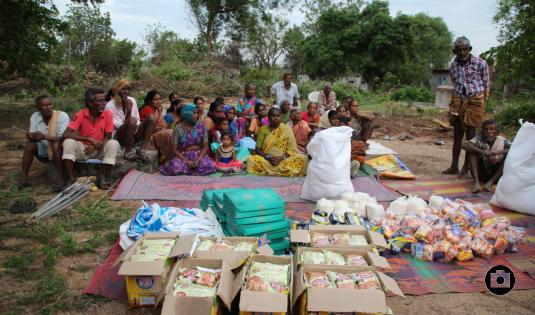

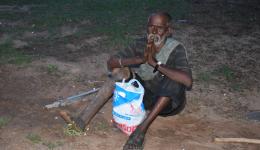
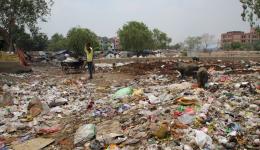
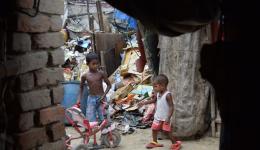
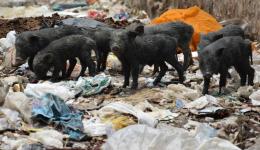
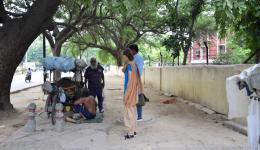
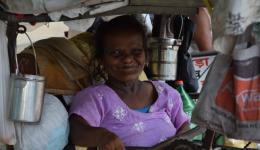
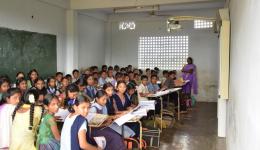
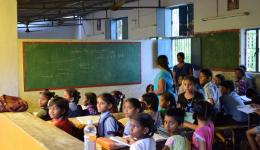
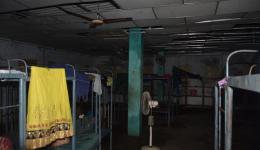
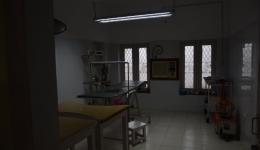
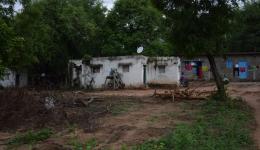
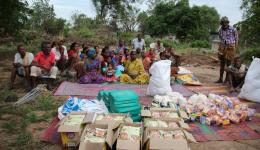
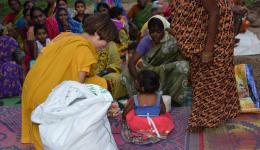
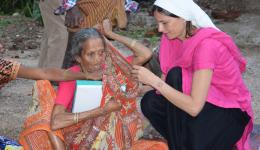
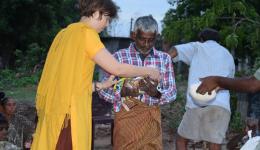
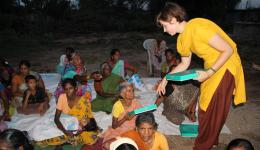
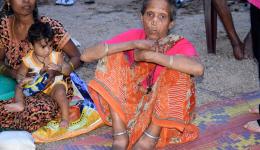
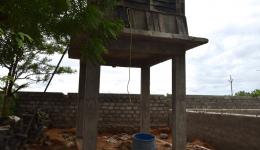
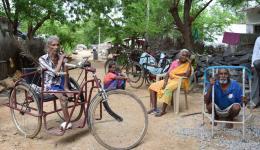
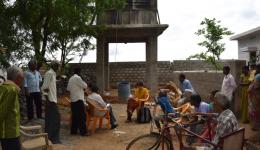
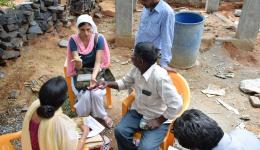
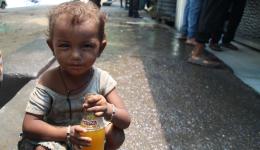
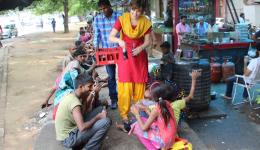
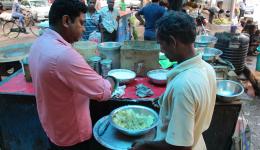
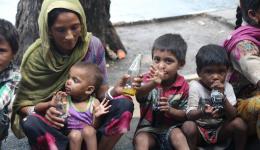
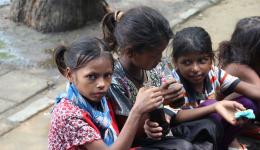
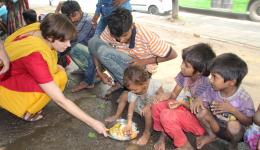
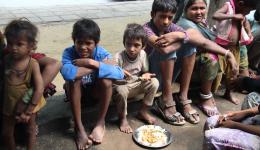
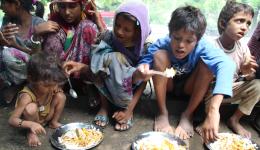
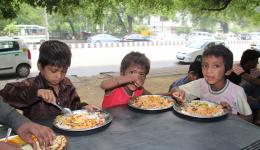
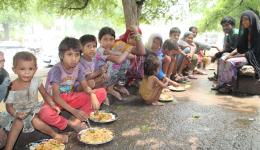
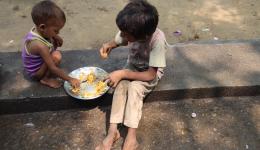
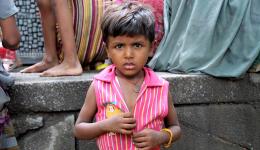
Comments(0)
Add new comment